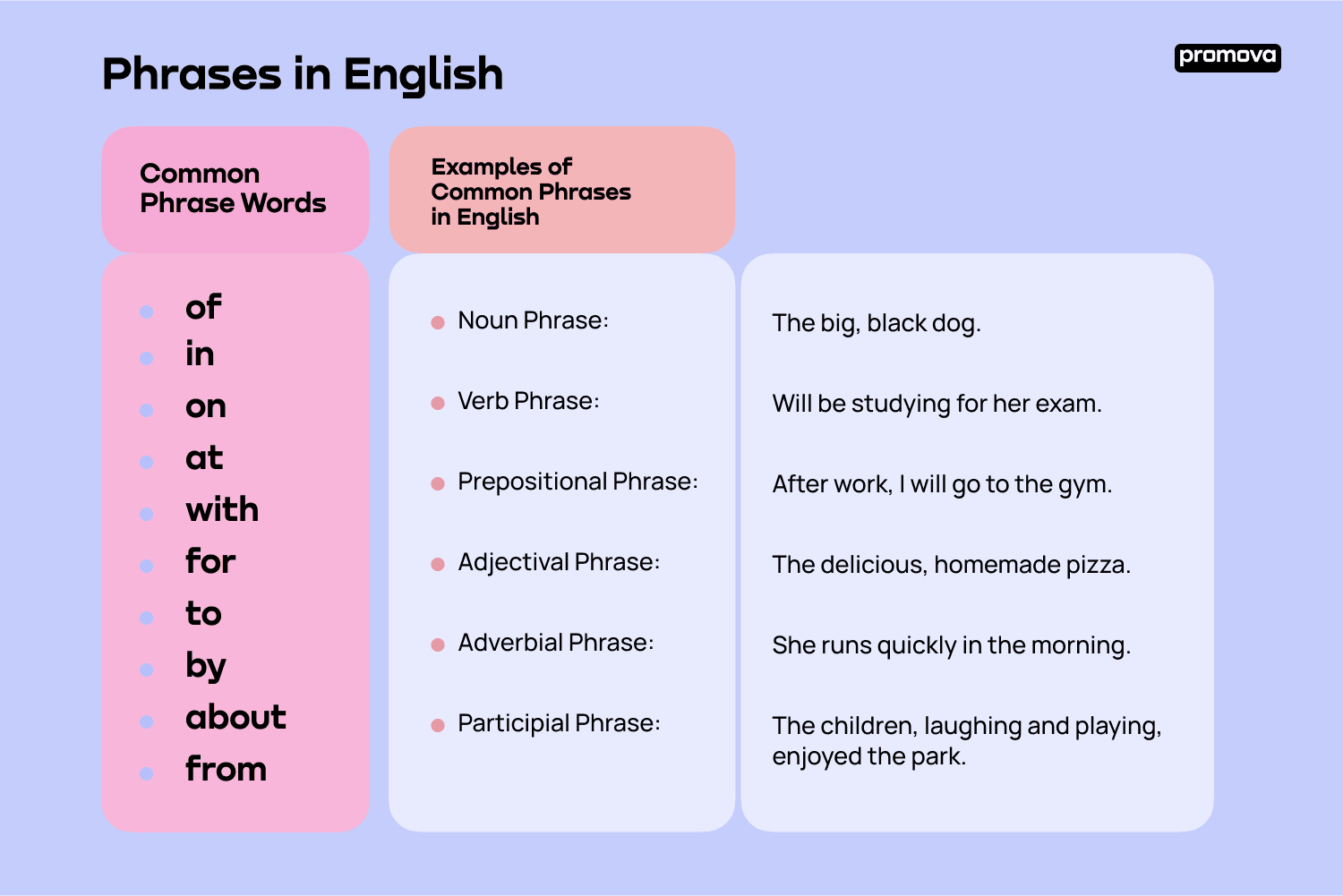Phrases in English
Contents
If you're learning English, you may have heard the term "phrase" before. But what exactly is a phrase, and how do you use it in grammar and conversation? In this reference, we'll explore everything you need to know about phrases in English, from their definition to examples and common phrase words.
What is a Phrase?
In English grammar, phrases are groups of words that function together as a unit, but do not have a subject and verb combination that makes a complete sentence. Phrases can be used to add more detail or information to a sentence, or to modify a verb, noun, or adjective.
Phrases in Grammar

Phrases can be categorized based on their function in a sentence. Here are six types of phrases you may encounter in English:
Noun Phrases
These are groups of words that function together as a noun in a sentence. They can be a single noun or a group of words that simply act as a noun. For example, in the sentence "The cat on the roof is hungry," "the cat on the roof" is a noun phrase.
Verb Phrases
These are groups of words that function together as a verb in a sentence. They include the main verb and any auxiliary verbs or helping verbs. For example, in the sentence "I am studying for my exam," "am studying" is a verb phrase.
Prepositional Phrases
These are groups of words that start with a preposition and end in a noun or pronoun. They can be used to describe location, time, or direction. For example, in the sentence "The book is on the table," "on the table" is a prepositional phrase.
Adjectival Phrases
These are groups of words that function together as an adjective in a sentence. They can describe a noun or pronoun. For example, in the sentence "The red car is fast," "red" is an adjectival phrase.
Adverbial Phrases
These are groups of words that function together as an adverb in a sentence. They can describe a verb, adjective, or adverb. For example, in the sentence "She sings beautifully," "beautifully" is an adverbial phrase.
Participial Phrases
These are groups of words that include a participle (an -ing or -ed verb form) and function as an adjective in a sentence. For example, in the sentence "The girl, smiling brightly, walked down the street," "smiling brightly" is a participial phrase.
2
How to Identify Phrases in a Sentence
To identify a phrase in a sentence, look for a group of words that function together as a unit, but do not have a subject and verb combination that makes a complete sentence. Once you find the phrase, determine its function in the sentence (noun, verb, prepositional, adjectival, adverbial, or participial) to understand its meaning and purpose.
Examples of Common Phrases in English
Here are some examples of common phrases in English:
- Noun Phrase: The big, black dog.
- Verb Phrase: Will be studying for her exam.
- Prepositional Phrase: After work, I will go to the gym.
- Adjectival Phrase: The delicious, homemade pizza.
- Adverbial Phrase: She runs quickly in the morning.
- Participial Phrase: The children, laughing and playing, enjoyed the park.
Common Phrase Words
There are certain words that are commonly used in phrases in English. Here are a few examples:
- Of
- In
- On
- At
- With
- For
- To
- By
- About
- From
By understanding these common phrase words, you can more easily identify phrases in a sentence.
Avoiding Mistakes
When using phrases in English, it's important to remember that they should be used correctly and in the appropriate context. Avoid using phrases that are too long or complicated, as they can make your writing or speech difficult to understand. Additionally, be aware of common errors such as using a phrase as a complete sentence - that only works for clauses.
Summary
A phrase is a collection of words which function together as a unit in a sentence, but do not have a subject and verb combination that makes a complete sentence. There are several types of phrases, including noun, verb, prepositional, adjectival, adverbial, and participial phrases. By understanding how to identify phrases, you can learn to create great sentences. Good luck on your journey to better English!
Comments